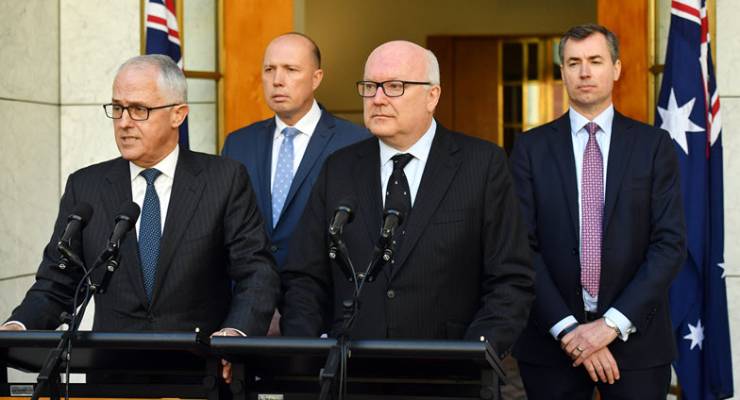
If the L’Estrange-Merchant review demonstrated the narrow, empire-building mentality of Australia’s national security bureaucracy — both those currently in office, and those who have since left — its coverage has demonstrated the shallow gene pool of Australian national security commentary.
Detailed coverage of the report in the media has been paltry, and has relied heavily on the usual suspects from the national security and defence commentariat. Thus, the Financial Review today offers a review of former senior bureaucrats Michael L’Estrange and Stephen Merchant’s report, from Rory Medcalf and offsider Jay Caldwell. Medcalf, who these days heads ANU’s National Security College, is a former Office of National Assessments officer, diplomat and Defence White paper panellist. Caldwell is a former security bureaucrat from, inter alia, the Office of National Assessments.
What did these two former national security bureaucrats think of the work of the two former national security bureaucrats who conducted the review? You’ll be surprised to know they gave it a glowing endorsement.
On Saturday, The Australian ran a piece by Peter Jennings, head of the taxpayer and defence company-funded military thinktank ASPI, on the review. Jennings is a former national security bureaucrat who still thinks the Iraq war was a good idea and wanted Australian troops to get back to Iraq to help fight Islamic State. Shockingly, he, too, thought the work of L’Estrange and Merchant was superb, and lamented that we were too distracted by the Dutton super-ministry to realise how wonderful it was.
Meantime, at the Lowy Institute — which also receives a generous whack of taxpayer money via a number of security agencies — Allen Gyngell reviewed the report. Gyngell is a former national security bureaucrat; he even headed — you guessed it — the Office of National Assessments. And you’ll never pick it, but this former national security bureaucrat thinks the former national security bureaucrats had done a wonderful job, too.
Any serious questioning of the nature of the national security and intelligence bureaucracy we’ve built, and the desire of L’Estrange and Merchant to expand it, give it more power and more funding, entrenching its power vis-a-vis the passing parade of politicians, has been absent.
It’s a bit different on defence and foreign policy: there, there are widespread disagreements on some major issues within the defence commentariat; if nothing else, Hugh White is always around to wonder how we can better serve the interests of Beijing.
But not, seemingly, in intelligence.
While Jennings was a Liberal staffer, all of the commentators listed here have worked under governments of both sides. There’s no question of partisanship. Or, possibly, there’s no question of political partisanship. Their partisanship, perhaps, is for the bureaucracy that they worked in, that they continue to operate in the orbit of, in thinktanks, and academia. There’s nothing particularly wrong with that — that’s the way of most major industries in Australia. But with a shrinking media, when that’s all that is on offer, the quality of public debate is demonstrably the poorer.








Probably universities are only interested in hiring people with the same experience, instead of getting some original thinking going – in these uncertain times a different learned viewpoint or two would be very valuable – I turn to the futurist David Houle if I want to get some idea of what lies ahead for the world….
“Hugh White is always around to wonder how we can better serve the interests of Beijing.”
Bernard, this is an offensive comment and undeserving of you. Professor White is one of the very few academics in this country that perceived the nature of the changing geopolitical balance in the world, and in East Asia in particular. This is not the first time Crikey has defamed him and as i suggested on a previous occasion when Crikey ran an equally offensive and ill-informed piece by you little red blog correspondent, the least you could do is offer Professor White space for an opinion piece. It is ironic that you should head your piece on the shallow gene pool in Australia for intelligence (& intelligent?) commentary and then demonstrate that shallowness. If Crikey doesn’t have the wit to run intelligent analysis on foreign affairs, then stay away from the topic altogether. You only embarrass yourself with nonsense such as this.
I have never known an intelligence analyst who was any good who was also a normal person – whether the job attracts odd people or makes ‘normal’ people weird is debatable, perhaps worth an article or five – but, as noted often (among others Clemenceau, I think), “war is too important to be left to generals” so intelligence and the affects thereof should never, ever be the sole remit of spook and their analysts.
Least of all the ONAnists who did such a sterling job of advising the Rodent on Iraq.
BERNARD, YOU HAVE PREVIOUSLY FAILED TO ANSWER MY QUESTION, are ASIO AND ASIS NOW CONSIDERED TO BE TOTALLY SEPARATE ENTITIES? We know JBish was not pleased and didn’t turn up to vote on PeDuts’ new mega Dept. Is it just that you’re ignorant, or….?